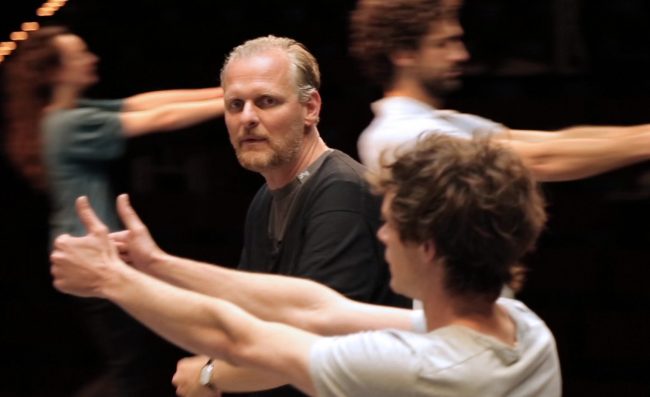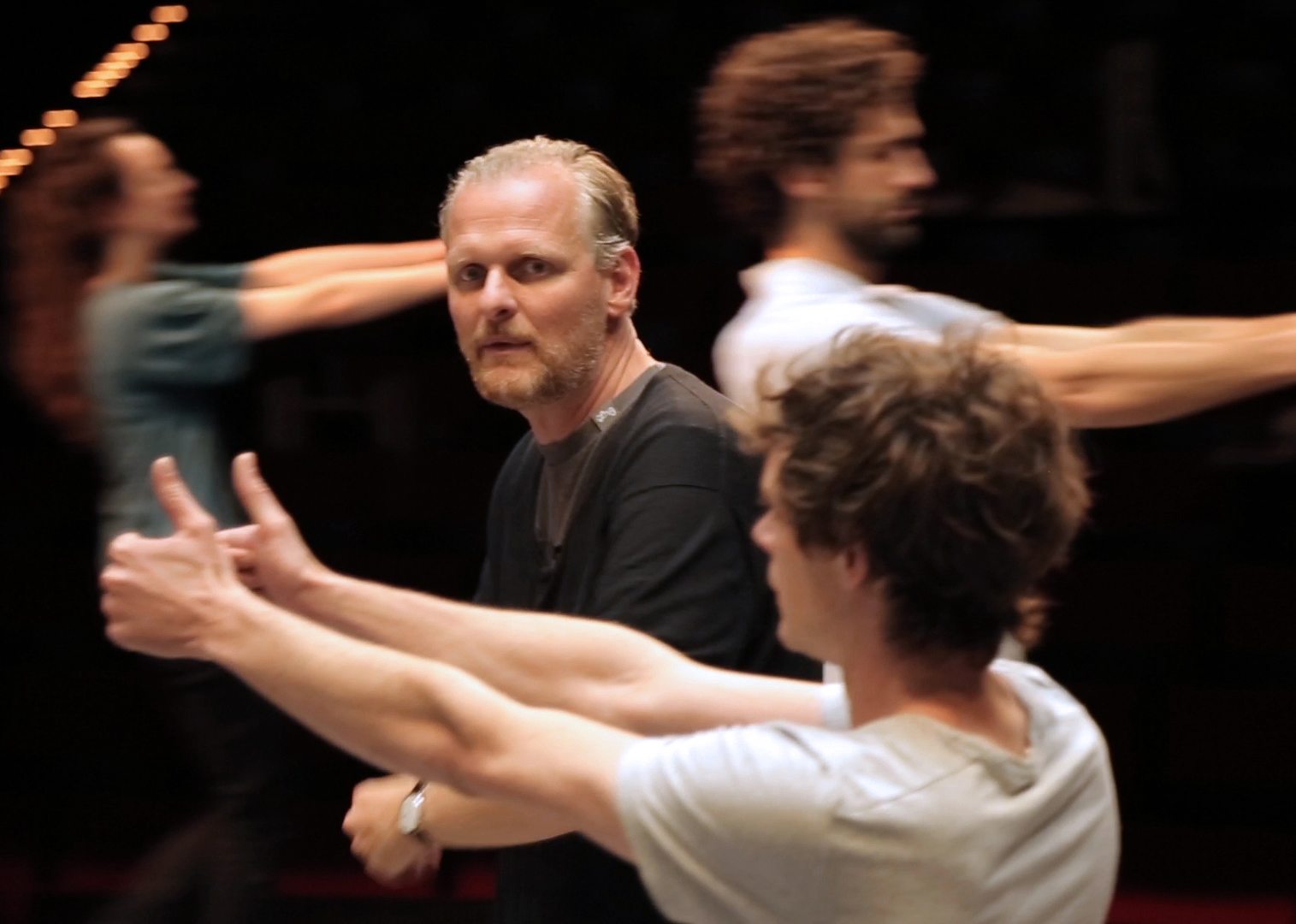The French Disconnection

The French Disconnection
Thomas Ostermeier’s production of Didier Eribon’s Returning to Reims arrives at a moment of great global flux – not least in the country where it’s set. Matt Trueman asks the director what one man’s memoir can tell us about the wider world today.

Once deemed the ‘enfant terrible’ of German theatre, Thomas Ostermeier has grown into a disruptive force right at its very centre. For almost 20 years, he has taken the helm of the Schaubühne theatre, a converted cinema on Berlin’s Kurfürstendamm, and in that time, he has become one of the country’s most prominent theatrical exports. His Hamlet, a radical remix, has been touring the world for almost ten years.
To British audiences raised on RSC-style reverence, Ostermeier’s approach often feels thrillingly fresh. He routinely chops, changes and churns up classic texts, always pulling them into the world we live in today, then intercuts them with pop songs and floods them with stark visceral imagery. His version of A Doll’s House (2003) ended not with a door slam, but with multiple gunshots as Nora Helmer left her husband for dead. He opened out An Enemy of the People (2012) into a real, unscripted public debate, and reimagined Hamlet (2007) as a fat manchild mucking about in a stage full of mud, stuck on repeat and endlessly asking that age-old question: ‘To be or not to be?’
Even after only a handful of shows, he has had a marked influence on British theatre, and his work sometimes stands for the idea of German theatre as a whole. To British audiences, Ostermeier is perceived as the ‘regie’ in ‘regietheater’ – the director in a theatre that puts the director first. We see a conceptual artist, a freewheeling radical, reshaping classic literary texts to his own ends. To do so, however, is to get Thomas Ostermeier wrong. Not only is he atypical amongst German directors, he is, first and foremost, a political artist.
***
Ostermeier trained as a director at the Ernst Busch Academy for Dramatic Arts in East Berlin, and was frustrated with the theatre he saw on the city’s professional stages. ‘I didn’t want to be in these shows with bad costumes, bad sets, bad music,’ he told me last year. Berlin theatre, as the tyro director saw it, was full of ‘old directors who didn’t know what they wanted to say to an audience, just taking care of their careers for the end of biographies.’
That attitude defined his first steps. He was still a student when the Deutsches Theater, one of the newly reunified city’s flagship venues, invited him to set up a second space in 1996, aimed at a younger audience, in an adjacent, empty shack. Working with the architect Jan Pappelbaum, his set designer ever since, Ostermeier turned a run-down workshop into an intimate, flexible studio theatre christened the Baracke (the shack). Working on a shoestring with a raw, raucous energy, the pair caused a splash with stripped-back stagings of ‘in-yer-face’ British plays by writers like Martin Crimp, Sarah Kane and Mark Ravenhill. His 1998 production of Ravenhill’s Shopping and Fucking, which included a graphic scene Ravenhill had cut from his final draft, became one of the Baracke’s calling cards. In a culture dominated by Brechtian devices and deconstructed classics, this was something thrillingly new. Not only was the Baracke named theatre of the year by the influential Theatre Heute magazine within two years, two of its productions were selected for the prestigious Theatertreffen festival alongside the biggest theatres in the country.
Such success led to Ostermeier taking over the Schaubühne in 1999, a move that sent shockwaves through cultural Berlin. Thanks to one of his predecessors, the internationally renowned director Peter Stein, the Schaubühne had built a sizeable international reputation. Ostermeier had not. At only 30, he was impossibly young in a city where artistic directors tend to dig in for decades. The Schaubühne is a vast, aircraft-hangar space – 90 metres long, 40 metres wide – split into three studios, each endlessly reshapeable. ‘There is,’ he says, ‘no better theatre building in the world. It’s as simple as that.’
***
Returning to Reims marks a new direction for Ostermeier: the first time he’s worked with a text not intended for performance. Published in 2009, Didier Eribon’s book is a memoir and a sociological study rolled into one. The author tracks back through his childhood, in the wake of his father’s death, to examine the working-class identity he rejected, both as an intellectual and as a homosexual. In the process, Eribon seeks to understand not just his own family, but a wider working class culture – and in particular its political shift from the far left to the far right, from the Communist Party to Marine Le Pen’s Front National. His book unpicks the causes: social structures that shut out the working classes; economic movements that entrench inequality; cultural shifts that dent traditional identities. It seeks to understand the change, not simply to lament the losses.
For Ostermeier, who only read the book last year, it felt like an urgent redress, so much so that his stage version was pushed into this year’s Festival programme late on. ‘In the mainstream media, we tend to be shocked about the rise of the new right. We demonise them: these are bad people, they’re close to fascists and so on. That’s not helpful.’ Indeed, he thinks, it’s almost hypocritical. ‘What Didier does is describe the role of the left in the rise of the right. That’s what we wanted to talk about.’
‘What happened all over Europe, with Blair, Mitterand or Schröder, is that the left had a major shift to the right. They were speaking the language of those who govern, not the language of those who were governed.’
This is, in many ways, at the heart of Ostermeier’s project – the politics beneath the surface of all those classic plays. Given the nature of international touring, we only see a small slice of Ostermeier’s work, and even then, lacking the local context, the sociopolitical specifics, we tend to read a literary or philosophical project. In fact, Returning to Reims is a continuation of a long line of enquiry. It follows An Enemy of the People in scrutinising the failure of the left, specifically the collusion of institutions around a neoliberal consensus. In Ostermeier’s production of the Ibsen play, his Doctor Stockmann delivered a French anti-capitalist text, The Coming Insurrection, to the town meeting against a community built on consensus – business, press and government all protecting one another. Last year, Ostermeier used Arthur Schnitzler’s play Professor Bernhardi to examine populism and anti-semitism, while his Richard III was an entertainer first and a dictator second – an all-too-contemporary despot.
In fact, he says, it goes further back. ‘Even my reading of Hamlet was to do with a young boy who didn’t understand what was going on in a corrupted government. As soon as he found out, he was incapable of taking acting.’ That, he insists, defines his ‘Hamlet generation’: apathetic until it was all too late; neoliberalism leading, inevitably, to a devastating economic crash. One may, in other words, smile and smile and be a villain.
***
However, for Ostermeier, the political is absolutely personal. His upbringing bears a lot of similiarities to the one Eribon describes. ‘When I read it, my first emotional reaction was to say, “Wow, at least you’re not alone”.’ Born in Soltau, a small town in the north of Germany, in 1968, Ostermeier’s background was determinedly working-class. His mother was a shop assistant, his father a rank-and-file soldier stationed in the south by the Bundeswehr. As such, Ostermeier spent his childhood in a provincial town in Lower Bavaria, something of an outsider among his peers. Theatre provided an escape, with afternoon drama classes allowing him time away from home and away from a father with whom he clashed. ‘There were money issues. There was a lot of violence. I would describe my father as Eribon describes his: a domestic tyrant.’
Ostermeier’s journey is much like Eribon’s: ‘I also took the lift from the lower class to the upper class through art and intellectualism.’ He has, he says, always sought to remember his roots, something you see in his determination to keep theatre accessible. His Schaubühne has maintained some of the spirit of the Baracke. His productions are couched in pop culture. It’s too easy for art to insulate itself, he believes, especially in a heavily subsidised culture like Germany. Institutions become ivory towers all too easily. ‘We, in our arty world, have, in a sense, taken the same path as politicians. Once we’ve made it, once we’re established and part of a certain elite, we tend to forget where we came from.’
Isn’t there a danger, though, of Returning to Reims doing exactly that? It is, after all, a French text being staged by a German director at an English festival for the international circuit – arguably about as far removed from Reims as is possible.
But Ostermeier’s theatre is nothing if not self-aware. His productions often argue with their performance texts, and Returning to Reims is no different. ‘This is a very important issue: how to portray social misery and working-class people in the press, on television, in the movies, as well as on stage.’
A performance is not a set text. It lives in the present, and Returning to Reims’ premiere comes after the French presidential elections last month. Emmanuel Macron’s victory, and the subsequent sweep of his party En Marche! in the National Assembly vote, looks to have left the far right on the ropes. Ostermeier had raised very public doubts, following the line of Macron’s socialist rival Jean-Luc Melenchon in advocating abstention. How does he see the result now? ‘It’s a major surprise,’ he says. ‘We know what Macron stands for. At least he’s honest about it, unlike Hollande and the rest.’
He sees Macron as a mere temporary solution, the plaster over a ruptured artery. ‘When you look at how many people voted, we have a huge problem. When less than 45 per cent of people that are able to vote, vote for the new parliament, when more than half of society doesn’t participate – we will see what happens. All my French friends tell me this will come to a head in the autumn. When Macron puts his plans into practice, they all reckon there will be major demonstrations and strikes. The issue absolutely hasn’t gone away.’
Matt Trueman is a theatre critic and arts journalist. He writes for The Guardian, The New York Times, The Financial Times and Variety, among other publications.



